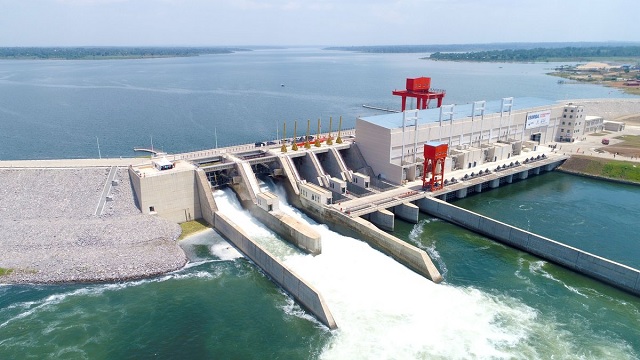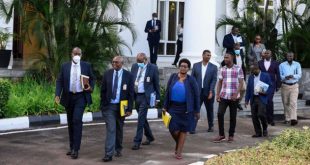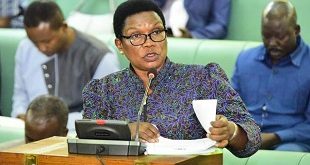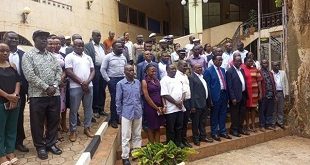
Kampala, Uganda | Isaac Khisa | How can African countries boost cross-border financing solutions on the continent? This was the main issue discussed during the Pan-African e-conference hosted by the United Capital PLC, a Nigerian-based financial and investment Services Company, on Friday.
Peter Ashade, the Group CEO at United Capital Plc. told his guests that cross-border financing in the Sub-Saharan Africa has had a limited impact in addressing funding gaps across various economic sectors on the continent.
He said the situation is worsened with the limited data on cross-border investment like it is with Chinese, US or Dutch investors on the continent.
He noted that while estimates shows that intra Africa Greenfield investment grew from US$4bn in 2006 to US$10bn in 2016 and the number of regional mergers and acquisitions deals doubled from 238 to 418 during the same period under review, more is still required.
“Coronavirus pandemic has exposed the vulnerabilities of the region as it continues to grapple with infrastructural development challenges compounded with capital flight,” he said.
“… this begs for innovative homegrown financial solutions and perhaps propel the continent to a new phase of growth.”
The conference was held on the backdrop of the ravaging coronavirus pandemic that has made countries across the world put in place mechanisms including lockdowns, closure of borders and banning public gatherings to curb the spread of the deadly virus.
Africa had as at June.27 recorded 359,606 confirmed cases, 9,283 deaths and 172,974 recoveries, according to World Health Organization.
Fola Fagbule, Senior Vice President at the Africa Finance Corporation said as one of institutions that is financing projects in Africa including Gabon’s Special Economic Zone and Djibouti’s renewable energy, it continues to find challenges with preparation, fiscal environment around tariffs and legal environment around these projects in a shape that is acceptable and attractive to institutional investors.
“But we work very hard to overcome those challenges,” he said. “One of the things that we are doing is focusing on export led industrialization in all our projects. Special economic zones is a theme that we are following with significant investments in Gabon, in particular, in special economic zones and we are expanding that across multiple industries including coal project in Nigeria.
Similarly, Yofi Grant, CEO at the Ghana Investment Promotional Center said it is clear that the African continent is not monetizing its assets enough.
He said there also seems to be a constant confrontation between the government policies and the private sector on how to achieve particular goals.
“It appears that the regulatory frameworks that were initiated on the continent in the early 1960’s are probably leaning more towards nationalistic economy or centralized government invention in business,” he said.
“But things have changed significantly over the past few years. We see the private sector participating more in national development than not.
“If you look at the past 10 years or so, you would realize that out of the 10 fastest growing economies in the world, six are in Africa. Why? It is due to government’s positive attitude towards the private sector.”
Yofi, however, noted that the problem to promote infrastructure investments in Africa still exists which further hampers intra-African trade.
He said there’s still a challenge of poor regulation and lack of cross-border standardization to facilitate cross-border trade and investments.
“These (standards) have not been effective because every country wants to do things in a way that befits them. They are not looking at the bigger market.”
He said though African companies such as Ecobank and Dangotes have been on growing in the past decades, capital formation to facilitate growth of many small businesses is still very slow.
He said small and medium enterprises are also not well structured to attract huge capital injection.
How to change this trend
Going forward, Gbenga Makinde, CEO, United Bank for Africa, Benin, said the continent has banks that now operate a cross many African markets and this presents a perfect opportunity to boost cross-border investments.
“We have Pan-African banks that have actually gone into Pan-African expansion across the continent. We have three headquartered in Morocco, two in Togo, and UBA group with presence in 20 African countries,” he said.
“We have other regional banks with a minimum of five countries and the essence of these Pan-African banks is to solve some of these challenges.”
However, he noted that African countries have a challenge with compatibility of their currencies among themselves.
“Our currencies at the moment are not compatible, we all rely on dollars, euros or pounds to transact business,” he said.
“There’s need for us to look inwards and solve this problem ourselves within the five sub-regional regional blocs.
“Why can’t we have a common currency that we can use to finance local infrastructure projects like in the West African bloc? We should have put this in place. The judicial systems and regulatory frameworks also need to be reinforced and,” he said.
West African regional bloc Economic Community of West African States last year said it intends to introduce a common currency called the Eco in June this year. However, Nigeria has called for postponement arguing that many countries in the bloc are yet to fulfill the requirements.
In East Africa, the East African Community plans to have a single currency by 2024.
Gbenga said it is also high time for the continent to begin to look inwards, starting with having its external reserves in African currencies.
“Why should we have over US$600bn in foreign currencies? We are talking about low investment in infrastructure. Why can’t we look within? Why can’t you, for instance, say like in Nigeria have a section for reserves in South African rand? Ghana Cedi’s so that countries can finance projects using local currencies to avoid fluctuations in payment for the utilities caused by borrowing in foreign currencies and repaying loans in local currencies,” he said.
In a rejoinder, Wale Shonibare, Director, Africa Development Bank said the multilateral lender is already extending credit to African countries in 11 currencies to finance their infrastructure developments.
He said there’s no doubt that the African continent need to invest in infrastructure.
“At the moment, per capita spending on infrastructure in Africa is about US$25. India spent US$48, China US$150 and US spent US$300,” he said.
He said it is now time for African countries to trade among themselves owing to the pandemic that has disrupted international supplies.
Currently, Intra-African trade stands at 16.6% compared with 68.1% in Europe, 59.4% in Asia, 55.0% in America and 7.0% in Oceania, according to the Unctad.
Yofi said there’s need for African countries to standardize their business operations, strengthen corporate governance and have compatible currencies.
“A good legal framework is very important, governance is critical. Political stability and consistency in legal frameworks will also help open the door for investment and trade,” he said.
“If you look at some countries that have significant business sector reforms, and I will mention Rwanda, Ethiopia and Mauritius, it is not surprising that the rate of wealth creation is faster than in other countries on the continent.”
The conference was held under the theme ‘Fostering Innovative Cross-Border Financing Solutions in Africa.
 The Independent Uganda: You get the Truth we Pay the Price
The Independent Uganda: You get the Truth we Pay the Price


